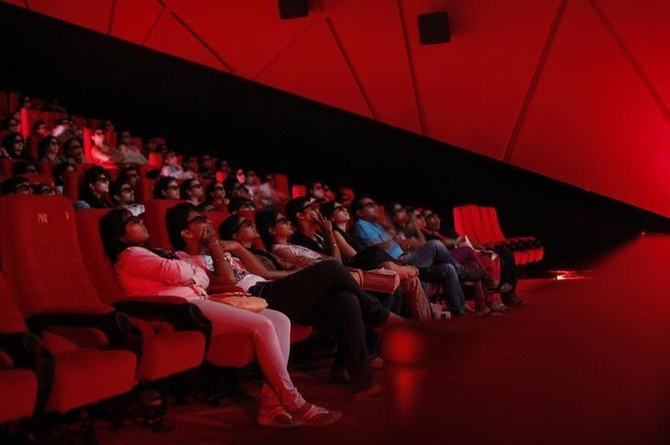PATNA: Cinema halls and open-air theaters in the eastern Indian state of West Bengal will be back in business from Thursday in defiance of a national lockdown to stop the spread of the coronavirus disease (COVID-19) outbreak.
The directive, which flouts the lockdown imposed by the ruling Bharatiya Janata Party (BJP) government in March, was issued by Chief Minister Mamata Banerjee.
Her decision “to return to normalcy” will be extended to include music, dance, and magic shows from next month.
In a tweet, Banerjee, who heads the All India Trinamool Congress (TMC), said: “To return to normalcy, jatras (Bengali folk theater), plays, open-air theaters, cinemas and all musical, dance, recital, and magic shows shall be allowed to function with 50 participants or less from Oct. 1, subject to adherence to physical distancing norms, wearing of masks, and compliance to precautionary protocols.”
The move has angered some lawmakers in the central government in New Delhi.
Babul Supriyo, an actor-singer and the BJP’s Minister of State for Environment, Forest, and Climate Change, told Arab News: “Her (Banerjee’s) latest move to re-open movie theaters at a time when all major public events across the world, including Wimbledon (UK tennis tournament), have been called off, is an illustration of Ms. Banerjee’s myopic politics, a cheap exercise of vote politics. There should be a limit to how far a politician should bend for votes.”
Supriyo, a long-standing opponent of the CM, said her decision was a “lethal populist anarchic move.”
He added: “This is nothing but an unleashing of anarchy. Mamata Banerjee has been in denial about the COVID-19 outbreak even when the number of casualties and infections was surging in West Bengal. As far as she is concerned the coronavirus is a myth.”
As of Wednesday, the total number of confirmed positive cases of COVID-19 in West Bengal had reached 253,768 with 4,899 deaths reported.
However, authorities are expecting thousands of Bengalis to converge for the upcoming Durga Puja festival in October, one of the most important events on the state’s calendar, when people step out of their homes in all their finery. A visit to the cinema during the Hindu festival is an essential part of celebrations for a majority of the 90 million people in the state.
The re-opening of movie theaters is, therefore, being seen by some as a populist vote-seeking move to please the festive Bengali populace, despite the risk of fueling the spread of COVID-19.
“For Mamata, who is struggling to hold on to her position as the most powerful politician in West Bengal, the opening of cinema halls is a sign of solidarity with ground-level workers in Bengal’s film industry who are struggling to keep their kitchen fires burning,” Prosenjit Chatterjee, 58, a legendary actor with nearly 400 Bengali and Hindi films to his credit, told Arab News.
While all precautionary measures have been taken to ensure safety at cinemas when they reopen, with only 50 tickets being issued per show for halls often capable of seating between 200 and 300 people, Banerjee’s decision has been criticized by members of her own party.
Indian film actress, Moon Moon Sen, of the TMC, told Arab News: “We have rampant community spread in half the world while people in parts of India are walking around on the streets without masks as if COVID-19 doesn’t exist. Aviation is so hard hit we don’t know whether the flights are coming or going. Given the scenario, does it matter if movie theaters open or not?”
Supriyo said it was unlikely that the BJP would follow Banerjee’s lead to reopen cinemas in other states.
“There’s no way the BJP government will allow movie theaters to reopen until the pandemic subsides. I am in consultation with my party’s senior leaders. We’ve decided to file a PIL (public interest litigation) against her (Banerjee) for deciding to reopen movie theaters from Oct. 1,” he said.
Senior officials at the Multiplex Association of India on Wednesday declined to comment on the move but a number of leading Bengal movie industry figures expressed relief at the CM’s ruling.
“To be honest, I am relieved, and so is the rest of the Bengal film industry. Technicians of the Bengal film and television industry were on the verge of starvation because of COVID-19,” Chatterjee said.
He added that the Durga Puja festival was a time when people “need to make money to be able to buy new clothes and to renovate and decorate their homes. Ms. Bannerjee has done the right thing. We know it is a tough time and a dangerous move. But if we can manage to reopen movie theaters without a surge in the pandemic, it would be a blessing. Many livelihoods depend on the film industry.”
One of Bengal’s most successful film directors, Srijit Mukherji, agreed but expressed cautious optimism about the commercial viability of opening cinemas to a limited number of people.
“It’s a welcome move. However, the rider that this move comes with — that there can only be 50 people in a movie theater — limits the commercial potential of medium- and large-budget films severely. However, something is better than nothing. This is the beginning,” he said.
“By following the COVID-19 guidelines we can hope that movie-theater attendance will eventually be normalized,” added the 43-year-old director of award-winning Bengali films such as “Baishe Srabon,” “Hemlock Society,” “Jaatishwar,” and “Gumnaami.”





















